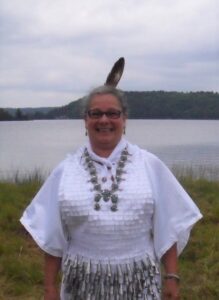‘A pow wow to remember’ series: Reverend Peggy Petahtegoose
Some go to pow wows to see the beautiful regalia. Others go to feel the strength of the beating drum. Some go to connect with family and friends. One way or another, pow wows draw us all in for one reason or many, but above all else, it’s to come together and celebrate us and those who came before us. Our traditions. Our culture. Our language. Our authenticity and identity. While the 2021 pow wow season may be impacted by the global pandemic, let’s use our memories from pow wows past to help us maintain our strength and perseverance.
The Anishinabek News hopes this series brings you light and hope during these challenging times of uncertainty, and inspiration to keep moving forward on your journey – whatever it may be; or maybe even dance.
The 2021 Great Lakes Pow Wow Guide can be found here.

By Reverend Peggy Petahtegoose, Atikameksheng Anishnawbek
Grieving has no time structure, boundaries, or limitations.
My own grieving took on a life of its own when my mother unexpectedly passed on December 17, 1983. I was 26 years old. But my age at this point ceased to matter, as time stopped. Existence was on autopilot. Days drifted into nights, months, and then years.
My lifeline is my family: Atikameksheng Anishnawbek. In July 1989, our family reserve held its first Traditional Powwow. I knew it was an important event for our family, so I packed up the kids and drove the 800-mile journey in 13 hours; pushing forward because I wanted to be “home.”
At Second Beach, where the Powwow was held, I saw an arbour built of cedar boughs. The scent of burning birch and ash, drifting from our sacred fire, comforted my weary heart. I kept walking further onto the powwow grounds until I reached my destination: the dance arena. Spectators were watching, waiting, and observing the dancers gathering. Within this circle, more cedar boughs created a secondary circular covering for the drummers and singers who will honour us with their songs.
My feet did not allow me to enter the arena. I had no strength. I was a spirit of hollow bones. I walked outside the sacredness and observed, waiting for the Opening Ceremony.
The Western Doorway to the dance arena is the exit for departing spirits of this world. I stood there to witness. The Eastern Doorway is the place of innocence and beginnings for our people. Through this Eastern Doorway, flags came in first, followed by dancers. Each group separated by their regalia arriving with grace, beauty and dignity. My senses were visually amazed by the movement of feathers, fur, bells, leather, colourful clothes, and beadwork.
In the distant background, a song on the breeze, quietly called my name, my soul, to listen deeply. I was captured. It came closer and I watched as women entered the dance arena.
Their dresses were covered in rolled silver cones, each about two inches long, made from snuff can lids. Layers of silver cones surrounded each dress, reflecting the strong noon sun. Each woman moved gently, proudly, humbly into the circle. It was at that point that I could no longer hold onto my grief, the deep-searing pain of losing my mother. Five years had passed, yet there I was outside of the Western Doorway crumbled on the ground like a piece of paper. Gut-wrenching sobs flooded my face, wails came from my heart and soul, and I was lost to my surrender. Never had the loss of my mother felt so exposed. Tears had certainly fallen. But not like this. Never like this.
My soul cried for the unrelenting sorrow of our short time together in this world. Those jingle dresses called me, telling me, “This is how your healing will begin, you must become a Jingle Dress dancer to heal. Not only yourself but your family, your ancestors, your history, your futures.”


